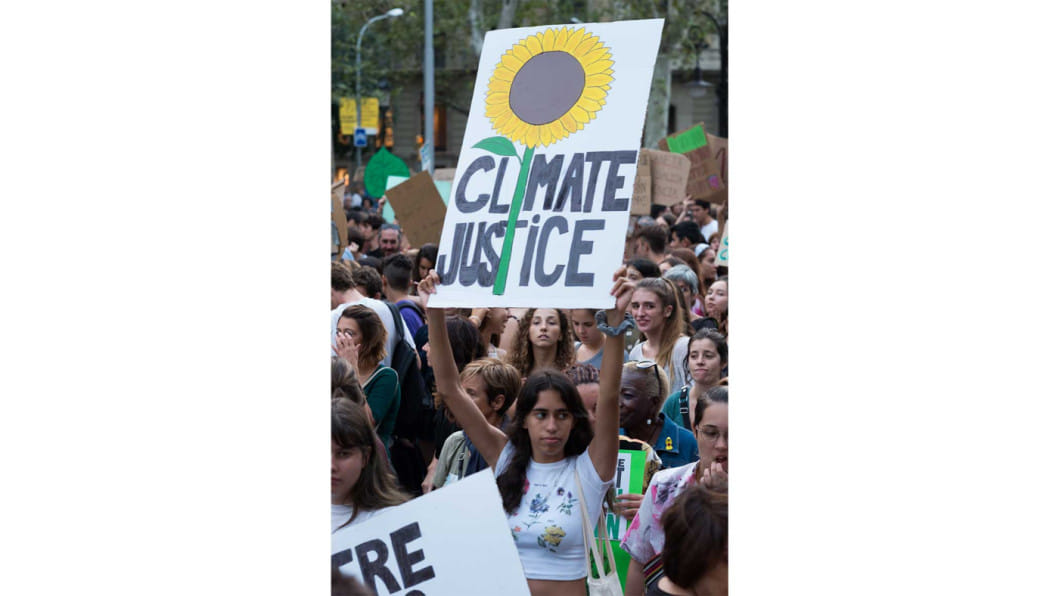2021 gives us reasons to hope for climate justice

Climate crisis aside, 2021 will be remembered with anguish and misery around the world due to the Covid-19 storms. Without a doubt, 2021 felt like a terrible repeat of 2020. The pandemic now seems like a lifetime experience, threatening us with new variants every now and then and unnerving the global experts and leaders who are unable to find an exit anytime soon.
The climate crisis also rages on. The United Nations Climate Change Conference (26th Conference of Parties—COP26), held in Glasgow, Scotland in November 2021, remained off target from the most ambitious goal of 2015 Paris Agreement to limit global temperature rise to 1.5 degrees Celsius above the pre-industrial level. While, to some, COP26 was a "turning point," others criticised the lack of commitments demonstrated by the decision to "phase down"—instead of "phase out"—the use of coal and other inefficient fuel subsidies. Climate activists, led by Swedish activist Greta Thunberg, held a "funeral" for COP26.
The high hopes for COP26 in Glasgow meetings were perhaps never going to be fully met in view of the pandemic, which indeed forced the summit to be delayed by a year. The build-up to COP26 left no doubts that 2021 experienced extreme weather events globally in terms of floods, droughts, heatwaves, and wildfires. Amid all these disappointments, a US climate activist reported, on a positive note, some climate justice "wins" for 2021. The wins are a mix of climate actions and land and indigenous people's rights, which are very fascinating stories in their own right.
The first and foremost of the climate justice wins in 2021 was the US rejoining the Paris Agreement under the Biden administration. This was definitely a big win. In 2017, President Donald Trump withdrew from the Paris Agreement, making the US the first country to formally leave the accord. The US was an important force behind negotiating climate deals, with the Kyoto Protocol never ratified. The withdrawal from the Paris Agreement obviously hurt the US reputation. The deal was drafted to strengthen the global response to the threat of climate change.
The swearing-in of Deb Haaland, the first Native American to be appointed as the US interior secretary, was another victory in 2021. A fierce Democratic Congresswoman, Haaland always focused on combating the climate crisis. As the secretary of the Department of the Interior, Haaland will play a crucial role in the Biden administration's ambitious efforts to combat climate change and conserve nature. The appointment was both historic and symbolic. Under her leadership, the department will now manage all public lands, endangered species and natural resources in the US, and establish rights of Native Americans.
To many, climate justice is a racial justice too. In 2021, the US city of Evanston in Illinois has begun the process of slavery reparations by giving out housing grants of USD 25,000 to 16 Black residents towards housing repair or costs. The city has established an initial fund in the amount of USD 10 million for distribution to its Black residents for the legacy and trauma of past racist housing policies. Experts consider this a "noble start," which may serve as a model for the future. Many more cities may take this step as an example in the wake of the Black Lives Matter movement in the US and elsewhere.
Canada, in February 2021, joined a global movement to recognise both indigenous law and the rights of nature by declaring Magpie River a legal entity. The majestic Magpie River runs nearly 300km in Quebec's northern region, and is culturally significant to the local Innu people. This will help the Innu to uphold their rights of sacred and ancestral rivers, forests and mountains for the benefits of all. Likewise, the Peruvian Kakataibo tribe formally secured 370,000 acres of their ancestral lands in July 2021 to keep them protected from stealing by non-indigenous outsiders. The Australian government recently moved to return 395,000 acres of land to the eastern Kuku Yalanji people. The transfer of land to the Natives put them in direct control and management of their ancestral lands—a key step to helping address and reverse the climate crisis.
Another important victory in 2021 was the scrapping of the controversial Keystone XL Pipeline Project by President Joe Biden that aimed at building a massive crude oil pipeline from Alberta, Canada to refineries in Illinois and Texas in the US. This was the result of a decade-long indigenous-led resistance and campaigns by environmentalists in Canada and the US. Similar stories of resistance were reported from many other corners. For instance, a predominantly Black community in Memphis, Tennessee came together to stop the 49-mile crude oil pipeline from becoming a reality, because the residents feared that the pipeline would harm their way of life and general well-being.
There are also other wins in many different countries, particularly those living through and adapting to climate changes. For example, the Maldives, which is no stranger to climate risks, is beginning to turn the tide by working closely with local communities to manage wetlands that are critical to reducing climate change impacts for creating a safer archipelago. For Pacific Islanders, both land and ocean have a huge economic, political and cultural significance. Tuvalu, a small island country, is in peril, but its residents are fighting back by introducing measures to protect the environment and natural resources. Bangladesh, already viewed as a climate success story due to its determined policies and adaptive strategies, is currently the chair (2020-2022) of the Climate Vulnerable Forum (CVF), a platform of 54 countries from Africa, Asia, the Caribbean Islands, Latin America and Oceania that are facing climate crisis. The CVF, under the leadership of Bangladesh Prime Minister Sheikh Hasina, held a strong lobby at COP26.
The 2021 climate justice wins underscore the importance of people's power and representation. As evident, many grassroots organisations around the world are working to deal with the climate crisis, empower the people at risk, and mobilise resources for adaptation and resilience to climate change impacts. From this point of view, and all that has been already said and won, it seems that 2021 was not as bad a year for climate justice. However, it was not enough, as the UN secretary-general described. We should, therefore, be better prepared for COP27, to be held at Sharm El-Sheikh in Egypt in November 2022.
Dr Mohammad Zaman is an international development specialist and an advisory professor at the National Research Centre for Resettlement of Hohai University in Nanjing, China.

 For all latest news, follow The Daily Star's Google News channel.
For all latest news, follow The Daily Star's Google News channel. 



Comments